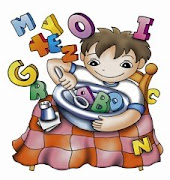Ayer estuve trabajando con la clase de 4º de E.S.O. un vídeo sobre algunas celebraciones del mundo anglosajón, y para ello recopilé algo de información sobre estas celebraciones para que las conocieran sobre ellas. Lo dejo aquí por si os puede servir para trabajarlas en clase.
• Christmas: 25 December (UK/US).- There are a lot of traditions connected with Christmas but perhaps the most important one is the giving of presents. Family members wrap up their gifts and leave them at the bottom of the Christmas tree to be found on Christmas morning. Children leave socks at the end of their beds on Christmas Eve, 24th of December, hoping that Father Christmas will come down the chimney during the night and bring them small presents, fruit and nuts. They are usually not disappointed! At some time on Christmas Day the family will sit down to a big turkey dinner followed by Christmas pudding.
The pulling of Christmas crackers often accompanies food on Christmas Day. Invented by a London baker in 1846, a cracker is a brightly colored paper tube, twisted at both ends, which contains a party hat, a riddle and a toy or other trinket. When it is pulled by two people it gives out a crack as its contents are dispersed.

• Independence Day: 4 July (US).- It commemorates the adoption of the Declaration of Independence of the 4 July, 1776, declaring independence from the Kingdom of Great Britain. Celebrations held this day include fireworks, parades, barbecues, carnivals, picnics and concerts, baseball games, political speeches and ceremonies, to celebrate the history, government, and traditions of the United States.

• Bonfire Night: 5 November (UK).- It’s also known as Guy Fawkes Night. It celebrates the failure of the Gunpowder Plot of the 5 November, 1607, in which a number of Catholics conspirators, including Guy Fawkes, attempted to blow up the Houses of Parliament in London. It’s celebrated by setting fireworks, lighting bonfires and eating toffee apples.

• Hallowe’en: 31 October (US/UK).- It has roots in the Celtic culture, and was introduced in America by Irish immigrants. The day is often associated with the colours orange and black, jack o’ lanterns, and costume parties.

• The Notting Hill Carnival: August Bank Holiday (UK).- It takes place in London on the last weekend of August since 1965. The festival was started by the immigrants from the Caribbean, who were facing racism, lack of work opportunities, and poor housing conditions. Now it’s a multicultural event which consists of a parade with dances, music and food.
*August Bank Holiday: it’s a public holiday in Britain, a day when all the Banks are closed. There are several bank holidays a year in Britain. The term bank holiday is not used in America.

• Thanksgiving: the fourth Thursday in November (US)/the second Monday in October (Canada).- Traditionally, it’s a time to give thanks for the harvest and express gratitude in general. Thanksgiving dinner is held on this day. They usually say a Thanksgiving prayer and eat a big roast turkey.

The pulling of Christmas crackers often accompanies food on Christmas Day. Invented by a London baker in 1846, a cracker is a brightly colored paper tube, twisted at both ends, which contains a party hat, a riddle and a toy or other trinket. When it is pulled by two people it gives out a crack as its contents are dispersed.

• Independence Day: 4 July (US).- It commemorates the adoption of the Declaration of Independence of the 4 July, 1776, declaring independence from the Kingdom of Great Britain. Celebrations held this day include fireworks, parades, barbecues, carnivals, picnics and concerts, baseball games, political speeches and ceremonies, to celebrate the history, government, and traditions of the United States.

• Bonfire Night: 5 November (UK).- It’s also known as Guy Fawkes Night. It celebrates the failure of the Gunpowder Plot of the 5 November, 1607, in which a number of Catholics conspirators, including Guy Fawkes, attempted to blow up the Houses of Parliament in London. It’s celebrated by setting fireworks, lighting bonfires and eating toffee apples.

• Hallowe’en: 31 October (US/UK).- It has roots in the Celtic culture, and was introduced in America by Irish immigrants. The day is often associated with the colours orange and black, jack o’ lanterns, and costume parties.

• The Notting Hill Carnival: August Bank Holiday (UK).- It takes place in London on the last weekend of August since 1965. The festival was started by the immigrants from the Caribbean, who were facing racism, lack of work opportunities, and poor housing conditions. Now it’s a multicultural event which consists of a parade with dances, music and food.
*August Bank Holiday: it’s a public holiday in Britain, a day when all the Banks are closed. There are several bank holidays a year in Britain. The term bank holiday is not used in America.

• Thanksgiving: the fourth Thursday in November (US)/the second Monday in October (Canada).- Traditionally, it’s a time to give thanks for the harvest and express gratitude in general. Thanksgiving dinner is held on this day. They usually say a Thanksgiving prayer and eat a big roast turkey.






3 comentarios:
Me encanta!!! Creo que te falta el Boxing Day (26th Dec), New Year's Eve and New Year, April Fool's Day (1st Ap), Easter para que esté perfecto, aunque seguro que hay muchas más!!!
xxx
CRIS
Gracias, Cristina! Es que lo hice de esas solo porque son las que se mencionaban en el vídeo, y como me pusiera a buscar todas las que había...
Pero próximamente cuando tenga un rato actualizo poniendo más celebraciones para ir completando ;)
Está muy bien como está Elvira. Felicidades por tu blog
Publicar un comentario